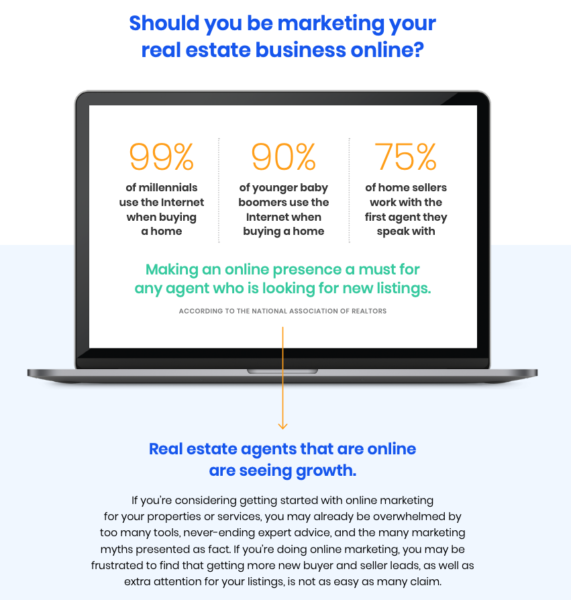
Every good real estate marketing plan has to start with some fundamental online marketing strategies.
In the last couple of years, more people have been searching for homes online. As a matter of fact, in 2020, 97% of home buyers used the internet in their home search.
And, although 45 million Millenials are now hitting the prime first-time homebuyer age, they’re not the only ones using the internet in their real estate decisions. Upwards of 90% of young Baby Boomers were already turning to the World Wide Web for help with their real estate decisions back in 2018.
With both real estate sales and prices predicted to rise this year, and virtually everyone starting their home search online, the truth is:
If you want to be successful in your real estate marketing in 2022, you’ve got to be online.
- Introducing our free real estate marketing plan
- What you need to know about online real estate marketing strategies
- What most real estate agents don’t understand about online marketing
- 5 key marketing strategies for real estate agents
- Use this real estate marketing plan to find more leads online (and close more deals)
- More marketing advice and strategies for real estate agents
Introducing our free real estate marketing plan
To help you start putting the most effective real estate marketing strategies to work, The Close and Constant Contact collaborated to develop the ultimate real estate agent marketing plan, which you can download now for free!

In our comprehensive 74-page real estate marketing plan, we go over the top online marketing strategies for real estate agents
Our real estate marketing plan includes:
- How to set your online marketing goals
- Where people will find you online
- How to develop website and social media content to reach your specific audience
- What you need to do to pull it all together to convert your new real estate prospects into genuine leads
What you need to know about online real estate marketing strategies
Having worked for over a decade in the real estate business as an agent and as a Digital Strategist for teams both large and small at big-name brokerages like Coldwell Banker and Berkshire Hathaway HomeServices, I’ve seen firsthand the challenges of marketing your real estate business.

We make it easy for you to have a growing and connected client base with all the marketing tools you need, synced to the tools you’re already using.
Most agents I’ve worked with over the course of my career are not short on motivation and drive. You know a solid marketing scheme is important; you know it is critical to taking your career to the next level.
What most of us are short on are things like time, energy, and if we’re being honest with ourselves, the confidence that this is a good way to spend our money.
Since I became a staff writer and real estate coach for real estate strategy site The Close a little over a year ago, I’ve gotten to help agents in all stages of their careers to solve these problems by helping them develop new, innovative real estate marketing ideas to save them time, save them effort, and best of all, demonstrate a clear return on their investment by generating real leads that result in closed sales.
What most real estate agents don’t understand about online marketing
Time and time again, one of the biggest issues I see agents face is a lack of a clear, unified real estate marketing strategy. There once was a day when managing your marketing on a single channel (like the newspaper) was enough to get you the phone calls you needed to build a successful year.
Now, real estate agents have to deal with multiple channels across the internet from Zillow to social media, each with its own message, that need to work in tandem with one another. This complexity makes it easy to get frustrated or burnt out.
Rather than throwing your hands up and losing out on the opportunities that online marketing presents, simplify your approach by starting with a strong marketing foundation that includes these five key elements.
5 key marketing strategies for real estate agents
Managing your real estate marketing plan comes down to five key strategies, all of which can be managed within Constant Contact for real estate.
- A mobile-friendly real estate website
- A real estate email marketing tool
- An easy way to implement real estate content marketing
- A primary social media channel for your real estate brand
- Updated real estate agent listings and reviews

Why are these the 5 key strategies for a real estate marketing plan?
Your online marketing presence has lots of incremental goals, but the overall goal is to do one thing: create more leads that you can convert into clients.
1. A mobile-optimized real estate website
In order to do that, you need a few things to be successful. The first is a fantastic, mobile-optimized website that prospects can visit and learn about you, and ultimately use to reach out to you when they’re ready to do business together.
2. A real estate email marketing tool
Not every prospect who reaches out to you is going to be ready to do business right away, which is why having a lead nurturing system in place to continue momentum down the funnel is essential. Email marketing allows you to maintain contact with people passively, providing them value with every message you send.
3. An easy way to implement real estate content marketing
Online content creation (or “content marketing”) is your chance to demonstrate to the world (and to Google) that you are an expert in your field, giving you a chance to provide information to your prospects that will not only help them in their buyer or seller process but also reinforce the idea that you’re the right person to help them.
Since your website is your home base and the best way for your prospects to contact you, hosting your content there is your best bet.
4. A primary social media channel for your real estate brand
But, just having your content online for Google to find isn’t enough. Remember, we’re not waiting for our customers to come to us, we are actively marketing to them, which is why having an active and engaging social media presence is also important. Here, you can point people back to the content you’ve created on your website, engage them in conversation, and create a dialogue that will allow your prospects to learn more about who you are, not just what you do.
5. Updated real estate agent listings and reviews
Finally, successful online marketing campaigns include a way for your satisfied clients to share their stories with your prospects, which means you need a way to solicit, manage, and promote your online reviews. Remember, referrals are a real estate agent’s best source of new business; great reviews will help super-charge your referral machine.
Use this real estate marketing plan to find more leads online (and close more deals)
Now that you know the five key elements of your online marketing strategy, dig into each element more thoroughly and get more real estate leads in our easy-to-follow and free (!) 74-page plan, The Download: Making Sense of Online Marketing for Real Estate.
More marketing advice and strategies for real estate agents
Check out some of our top real estate marketing articles and step up your digital real estate marketing strategy!
- Real Estate Marketing Calendar
- Learn about real estate drip campaigns
- Get an overview of our top real estate marketing ideas
- Real estate social media posts that get attention
- Learn how to get more leads in real estate
- Set up an effective real estate newsletter
Did you know? Constant Contact offers a corporate account option designed for real estate brokers/owners, so you can provide agents with all the digital marketing tools they need — in one place! Benefits of a corporate account include a discounted rate for your agents, locked branded templates to keep brand consistency across all users, tools to track results (opens, clicks, etc), and more. For more information, fill out this quick form and we’ll reach out with more information on how you can make your marketing easier and more consistent throughout your brokerage.




